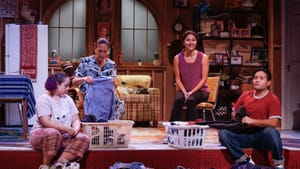Stay in the Loop
BSR publishes on a weekly schedule, with an email newsletter every Wednesday and Thursday morning. There’s no paywall, and subscribing is always free.
A worthy homecoming
Theatre Exile presents Makasha Copeland’s Extreme Home Makeover

In many ways, Extreme Home Makeover is a fitting choice to inaugurate Theatre Exile’s 25th anniversary season. Like the company itself, Makasha Copeland’s world premiere balances charm, edge, and pathos tempered with a healthy dose of grit. Parallels emerge too when you consider the play’s themes—both the ones on the surface and the ones hidden in the subtext.
For Valentina (Jessy Gruver), a recent widow struggling to keep her family above water, the similarly named ABC television show represents a tangible expression of the American Dream, not to mention a desperately needed new beginning. Caring for her ailing mother Guadalupe (Yajaira Paredes) and two precocious children, Marco (Angel Sigala) and Lupe (Krystal Rosa), has stretched her to the limit, and the generational home they all share keeps falling into a disrepair she cannot fix on her own. She sets her sights big, hoping for a miracle to spruce up her surroundings—and assuage her sadness in the process.
Back to a new home
Exile made over its longtime digs on 13th and Reed Streets in 2019, returning to South Philly after several nomadic seasons. Its new complex also seemed like a fresh start for the much-admired midsize company, one that was paused unceremoniously by the pandemic before it could even complete a full season. When artistic director Deborah Block, who also helms this production, welcomed the audience on opening night, she alluded to the sense of unfinished business resumed by returning to their new old home.
It proved a more-than-welcome return. Copeland offers a rich portrait of a clan at a crossroads, sure of their love for each other but hesitant toward what lies ahead. The writing does not sugarcoat the hardships they face or the sense that Valentina’s Hail-Mary approach to better living might be little more than a pipe dream. Dynamics unspool through shorthand, body language, and fluid shifts between English and Spanish. (The family is Tejano, and Guadalupe makes sure to educate the unseen TV overlords on the real history of the land they occupy.)
Believable comedy and tension
Copeland finds abundant humor in the framing device of a video submission, with Valentina carefully orchestrating how dire her family’s poverty should seem, balanced by examples of their resilience. Naturally, there is a darkness to this comedy too. Gruver threads a harried sense of knowingness into a monologue about toilet paper—how it remains more economical to buy the generic brand, of which more needs to be used, than Charmin. A scene that finds the quartet exaggeratedly eating through the contents of their fridge before the food turns rancid brims with a recognizable sense of urgency.
There are also moments when the characters, alone or in conversation with each other, let their guard down in revealing ways. Try not to squirm when Valentina coaches Lupe, who already seems world-weary at 10, to seem appropriately desperate before the cameras roll. You’ll feel the same way when Marco, rejected after his first job interview, worries that he isn’t doing enough to keep the household afloat. The relationship between Guadalupe and Valentina is shot through with a tension that Gruver and Paredes make imminently believable; you sense that while the older woman loves her daughter, and understands her plight, she has very little patience for her fanciful scheme.
Showing care
As the play progressed, I wanted more of these moments. The narrative frame of self-taping grows somewhat repetitive, and when it’s used once again to move the action toward denouement, it feels both predictable and overwrought. Copeland clearly understands these people and has built their backstory commendably, but they could have spent more time showing directly how they simultaneously care for and irritate each other.
Yet even as the writing starts to coast near the end, Block’s production fires on all cylinders. Sigala and Rosa manage something almost unthinkable—they both play children without an ounce of cloying overstatement. Rosa particularly colors the palpable melancholy beneath Lupe’s outwardly chipper personality. And as the struggling matriarch, Gruver strikes a raw nerve—a woman holding on desperately to her last hope, whose fingers you can all but see loosening their grip.
And in a show like this, which revolves around four claustrophobic walls, the set matters. Colin McIlvaine does a masterful job telegraphing how much life can be compressed into a small space. Even though we can imagine every creak and crack in the plaster—Drew Billiau’s lighting helps here too—we can also see the love and care infused by Valentina and Guadalupe. Exile lavishes that same care on this poignant, worthwhile new play. It has truly come home.
What, When, Where
Extreme Home Makeover. By Makasha Copeland, directed by Deborah Block. $20-$35. Through November 21, 2021, at Theatre Exile, 1340 S. 13th Street, Philadelphia. (215) 218-4022 or theatreexile.org.
Theatre Exile is a fully vaccinated workplace. Audience members must provide proof of full Covid-19 vaccination to attend a performance, and masks must be worn inside the building at all times. Seating capacity has been reduced for this production to accommodate social distancing.
Accessibility
Theatre Exile is a fully ADA-compliant venue, with all-gender restrooms.
Sign up for our newsletter
All of the week's new articles, all in one place. Sign up for the free weekly BSR newsletters, and don't miss a conversation.

 Cameron Kelsall
Cameron Kelsall